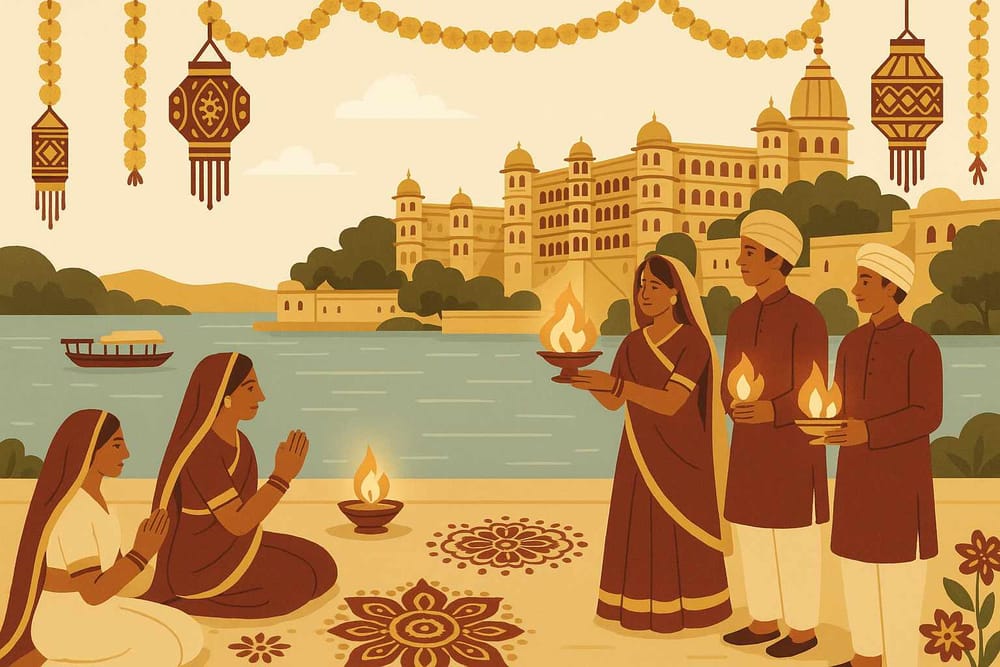
Udaipur Cultural Immersion: Traditions, Beliefs, and Spiritual Practices
Exploring the Spiritual Essence of Udaipur's Traditions
Udaipur, known as the 'City of Lakes,' isn't just famed for its picturesque beauty; it's a cultural center deeply rooted in tradition. The city’s heritage reflects centuries of devotion, spirituality, and artistry. These traditions are more than rituals; they're a way of life, keeping the heart of Rajasthani culture beating strong.
The Revered Dashakarma Samskaras: Life’s Sacred Milestones
The Dashakarma Samskaras, ten sacred rites of passage, guide individuals through life’s key stages. Each ceremony carries profound spiritual meaning.
- Jatakarma (Welcoming Birth): In Udaipur, a child's birth is a joyous occasion filled with warmth and blessings. Priests chant Vedic mantras, symbolizing the child’s entry into a world guided by divine grace. This ceremony sets a spiritual foundation for the newborn.
- Namkaran (Naming Ceremony): Astrologers play a key role here. A name, believed to positively shape the child’s destiny, is chosen based on their horoscope. This highlights the importance of celestial influences in shaping a life.
- Annaprashan (First Taste of Food): This ritual signifies the baby’s first step towards nourishment and independence. Families offer prayers for health and prosperity as the child experiences solid food for the first time.
- Vivaha (Marriage): Weddings in Udaipur are grand celebrations, a beautiful blend of joy and deep-rooted devotion. Each ceremony, from Haldi to Pheras, is rich with cultural symbolism, representing two souls uniting under divine blessings.
- Antyeshti (Final Rites): With utmost reverence, families perform last rites, ensuring a peaceful onward journey for the departed soul. This final samskara emphasizes the cyclical nature of life and the importance of honoring the departed.
These samskaras beautifully reflect the cycle of life and the spiritual thread connecting each moment to cherished traditions.
The Guiding Stars: Astrology and Vastu Shastra in Daily Life
Astrology and Vastu Shastra are deeply woven into the fabric of daily life in Udaipur, offering guidance and harmony.
- Kundali Matching (Horoscope Matching): In arranged marriages, the compatibility of horoscopes is carefully considered to ensure harmony between the couple. This practice emphasizes the significance of celestial influences on relationships.
- Festive Timings: Key festivals like Diwali and Holi are celebrated on astrologically auspicious dates, maximizing positive energy and blessings during these joyful times. This reflects the deep connection between celestial events and cultural celebrations.
- Vastu-Compliant Homes: Many homes in Udaipur adhere to Vastu Shastra principles. From the main entrance placement to the layout of rooms, the aim is to invite positive energy and create a harmonious living environment.
- Panchang Calendar (Hindu Almanac): Families often consult the Panchang to determine auspicious timings ("muhurats") for important ceremonies, events, and even daily activities. The alignment of celestial bodies is considered crucial for ensuring success.
Astrology and Vastu Shastra help strike a balance between the physical and spiritual worlds, guiding families toward happiness and prosperity.
Traditional Attire and Ornaments: A Spiritual Expression
In Udaipur, traditional attire and jewelry aren't merely decorative; they carry deep cultural and spiritual significance, reflecting a rich heritage.
- Vibrant Clothing: Women grace themselves in colorful Ghagra-Cholis with exquisite embroidery, while men don Dhoti-Kurtas and Pagdis (turbans). Colors hold meaning: saffron symbolizes purity, while yellow signifies prosperity during festive occasions.
- Jewelry with Meaning: Ornaments such as Nath (nose rings), Rakhdi (headpieces), and silver anklets are often seen as protective charms, believed to safeguard health and well-being. Each piece carries its own significance, passed down through generations.
- The Mangalsutra (Sacred Necklace): For married women, the Mangalsutra is more than just a necklace; it symbolizes commitment and represents a sacred bond between husband and wife. It is a visible symbol of their marital status and commitment.
- Artisanal Craftsmanship: Udaipur’s jewelry showcases artistic traditions like Meenakari and Kundan, reflecting generations of skill. These intricate techniques make Udaipur’s jewelry highly valued.
From clothing to ornaments, every element tells a story, connecting individuals to their heritage and fostering a sense of identity and pride.
Udaipur exemplifies how traditions can thrive in modern times, offering valuable lessons in living a life filled with purpose and meaning. To delve deeper into the rich tapestry of Indian devotion and spirituality, explore the resources available at Bhaktilipi.in. This online platform offers a wealth of information on sacred texts, stories, and rituals, helping you connect with India's spiritual heritage.
Carrying Forward the Legacy of Udaipur
Udaipur is a living embodiment of India’s rich cultural and spiritual heritage. Its traditions, beliefs, and practices remind us of the timeless values that enrich our lives. From the sacred Dashakarma Samskaras to the guiding principles of astrology and Vastu, Udaipur's culture celebrates the harmony between the material and the divine.
By embracing these traditions, we connect with something larger than ourselves—a legacy passed down through generations. Udaipur invites us to live with intention, gratitude, and respect for our roots. As you experience the city's essence, may you find inspiration to honor and preserve these timeless traditions in your own life.
Udaipur offers not just a journey through its charming streets but also a journey within—a chance to rediscover the values that unite us all.
FAQs on Udaipur Cultural Immersion
What are Dashakarma Samskaras, and how are they practiced in Udaipur's Rajasthani traditions? Dashakarma Samskaras are the ten essential Hindu rites of passage, marking key life stages. In Udaipur, these are deeply ingrained in Rajasthani customs, often performed with specific rituals and offerings to honor deities and ancestors, reflecting a deep respect for heritage.
How does astrology (Jyotish) influence daily life and festivities in Udaipur? Astrology is deeply embedded in Udaipur's cultural fabric. Jyotish guides many life events, from setting auspicious dates for weddings and housewarmings to determining festival timings. Families often consult astrologers, showcasing the significance of celestial influences.
What is the significance of Vastu Shastra in Udaipur's homes and temples? Vastu Shastra, the ancient architectural science, influences the design of homes, temples, and workplaces in Udaipur. Buildings are often aligned to specific directions to promote balance and attract positive energy, emphasizing the importance of harmony between the built environment and natural forces.
Why do traditional attire and ornaments have spiritual meanings in Udaipur's culture? Rajasthani attire, including ghagras, turbans, and jewelry, isn't just about aesthetics; it carries spiritual symbolism. Colors and patterns often denote marital status, community identity, or blessings. Ornaments are believed to enhance positive vibrations, connecting the wearer to their heritage.
What are some unique spiritual practices followed during festivals in Udaipur? Festivals in Udaipur showcase unique spiritual practices, such as Kalash Sthapana, havans, and devotional folk songs. Devotees participate in processions and temple visits, blending spirituality with cultural expression.
How is the cultural heritage of Udaipur preserved through its traditions? Udaipur’s heritage thrives through storytelling, folk dances, and active participation in festivals. Involving younger generations ensures these traditions are passed down, maintaining a living link to the past.
What role do temples play in Udaipur's spiritual and social life? Temples are central to Udaipur's spiritual and social landscape. They host daily prayers, charitable activities, and spiritual discourses, fostering a sense of community and shared beliefs.
Are there any specific beliefs linked to nature in Udaipur's traditions? Yes, nature is deeply revered in Udaipur. Lakes, mountains, and trees are considered sacred, and rituals like offering water to the sun or planting trees during festivals demonstrate this reverence.
About Us
At Bhaktilipi.in, our mission is threefold:
- Preserve: We safeguard timeless devotional literature from various languages and cultures.
- Reimagine: We present these works in ways that resonate with contemporary readers while honoring their origins.
- Share: We disseminate the wisdom of bhakti with authenticity and care.
We curate sacred texts, stories, and poems, offering both original versions and translations to ensure accessibility for generations to come. Our platform bridges the gap between tradition and modernity, making it easier for you to explore bhakti.
Connect with us: Subscribe to our newsletter or follow us on Facebook, Instagram, and YouTube.
A passionate group of people dedicated to preserving India's knowledge of Dharma, Karma, and Bhakti for ourselves and the world 🙏.
